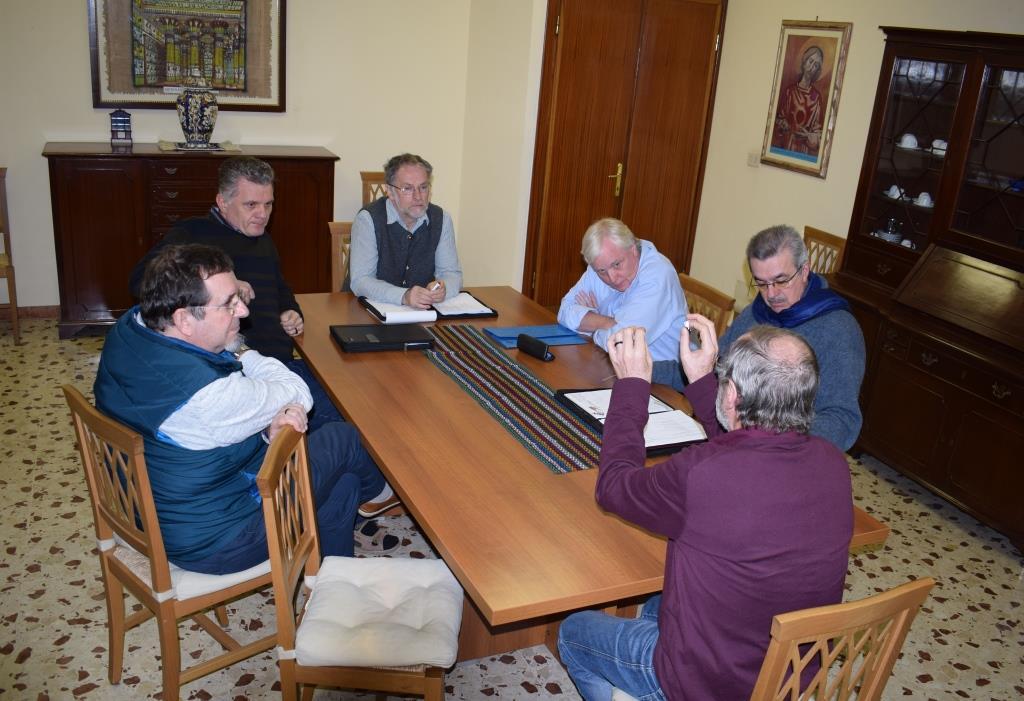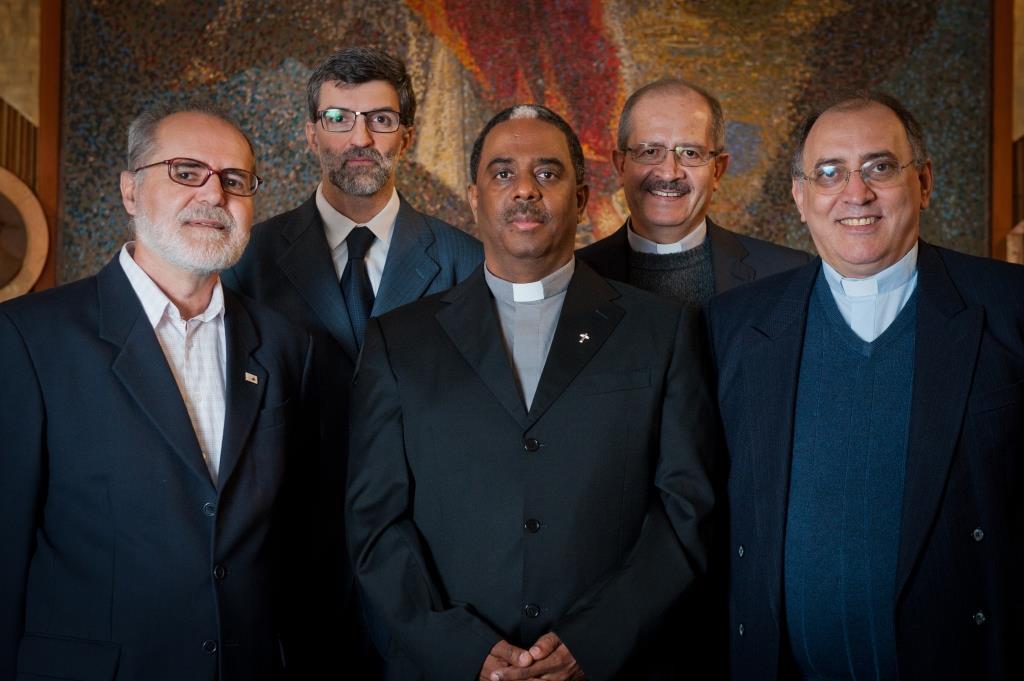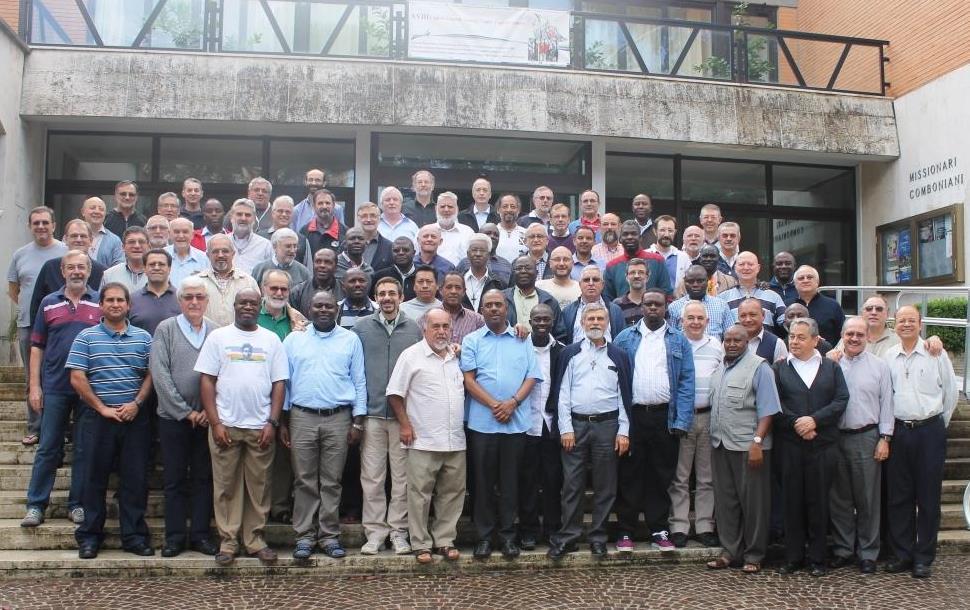Daniel Comboni
Comboni Missionaries
Institutional area
Other links
Newsletter
Tuesday, February 10, 2015
The recent visit to the Ethiopian Province by fr. Enrique, Superior General, and the assessment of these five years of his mandate, has pushed me to lay out some considerations about the incoming General Chapter, to which I will once again take part as delegate of this Province. The sharing of his experience as responsible of the Institute in these years has once more underlined the urgent need we all have of an extra ‘push’ in order to fly higher, as Institute, in our work of evangelization. To do this we need that new faces, new energies, new inspirations may emerge. In the picture: Fr. Giuseppe Cavallini, Comboni missionary, the author of the article.
I presume that in the incoming Chapter 2015 there will be, as it happens, somebody boasting of having participated to 4, 5 or even 6 General Chapters! These people might feel proud of their ‘capitular longevity’ and the ‘authoritativeness’ deriving from it, rather than reflect on the possibility of being looked upon as sort of ‘dinosaurs’ within the Institute.
As for me, I’m well over 62 years, an age considered in our days not yet of retirement (rottamazione…), and yet I feel the weight of having to sit once again, for the third time, in the General House Capitular’s hall (When they voted me I was coward enough not to publicly renounce…).
Indeed, I don’t feel proud at all of standing once again in the Chapter hall, I just hope not to see the same faces, with their ‘stains and signs of the age’, sitting on those chairs, a signal that the so often reaffirmed need of ‘renewal’ in the Institute might not be felt as much as it is proclaimed.
Indeed, I have read a good number of new names among the Chapter’s members, a concrete sign that we desire to see our Institute and our activity of evangelization not so much concerned with self-preservation but in an outward movement of renewal in spirit, in faces and in missionary methodology. In this sense we have certainly responded positively to the appeal of pope Francis to find new enthusiasm and new creativity in our enterprise.
As for myself, I hope that my confreres of the Ethiopian Province may not judge me negatively if I confess that I will go to the Chapter not animated by this same enthusiasm. On the other hand, I already invited them to let me know of any special message or input I should convey as their ‘mouthpiece’ to the Chapter!
Notable contributions
I begin by referring to the input published in these past years by some well known confreres (frs. Pierli, Manuel Augusto and Benito De Marchi) on a re-reading of some previous General Chapters. The in-depht analysis of the Chapters, starting from the one of 1969, by fr. Benito is an historical/hermeneutical ‘voyage’ through the Chapters so rich that it should be a ‘must’ for each confrere to read and study it. His paper allows us to understand who we, as Combonis, are today, and the reasons for which we are who we are, and - as such - it gives food for thought to all those who will take part to the incoming Chapter! I would suggest particularly to the younger confreres to take time to read it, so as to find new inspiration as they will enter the capitular hall. After reading and pondering over it I told myself how wonderful it would have been if the clarity with which Benito describes the journey towards the formation of a new paradigm of mission could have, as its concrete result, the implementation of the dream which emerges from the Chapters. However we cannot discard the hope that the far-sighted vision communicated by the Chapters may one day be fully realized. Indeed, we must be humble enough to recognize that a great part of the indications of the Chapters have remained ‘dead letter’. Using the well known method of see-judge-act, I find it easy to affirm that, in assessing ourselves as Combonis, we are generally very good in seeing-judging, as the inputs of our three confreres clearly show, while we appear inadequate, unprepared and with no expertise in the third aspect (act), namely in implementing what is being so profusely and richly elaborated by the General Chapters. Fr. Pierli has aptly described the distorted expectations that often are being attributed to the Chapters when he writes: “My impression is that the General Chapter is considered a kind of fetish, something which, no matter what, will obtain some success given that, in any case, ‘something will certainly come out of it’! The handling of the human dimension must instead be seriously taken into account, since it influences notably the possibility of becoming a valid instrument for discernment. Often my impression is that in our Chapters the conditions for a true discernment seem very weak. The ancient Romans used to say: “Senatores boni viri, senatus mala bestia” (The individual Senators are good people, the Senate is an evil beast!”); that is: “all the wisdom which the individuals may have, could disappear when people gather together”. On the other hand, I agree with the analysis of Manuel Augusto (underlined also in Pierli’s input…) concerning the gap which is generally present between the Chapter’s dynamics and the successive implementation of the concrete decisions of the Chapters he examined. Among the reasons for this gap, Manuel Augusto identifies the fact that, often, those who should bring to the Chapters the voices and instances of the confreres who sent them, end up – not only for their responsibility – to bring to the Chapter their own personal views and opinions. I agree also where he denounces the incapacity of many Chapter members (as well as of the General Administrations…) to communicate with satisfactory efficacy to the various Circumscriptions and Comboni communities the decisions and the directives of the Capitular Assembly, once they return to their places of work. It is thus a question, as Manuel Augusto states, of “reducing the distance between the concrete guidelines emerging in the Chapters and their concrete implementation at personal, communitarian, provincial and Institute levels”.
Exaggerate expectations
With humbleness I must confess that in the two Chapters to which I took part, I counted myself among those who didn’t do enough to communicate the results of the Chapter. These six years since last Chapter have quickly gone by, and the new Chapter is at the doors. The saying goes that as one grows older the ideals and the enthusiasm of young age tend to decline, replaced by a tendency to become ‘more realists than the king…’, and to evolve into good ‘firefighters’ after having tried for years to act as ‘arsonists’! I guess this may be what’s happening to me, due in good part to the often apparently invincible challenges which mission life presents today, in the growing complexity of the ‘global mission’. I have anyway good reasons for reducing my expectations, my belief in any possible ‘revolutionary change’ has far gone (unless a ‘pope Francis’ style of General Superior would emerge among us…). Often we tend to cultivate exaggerate, if appreciable, expectations from the General Chapter; for example the most recent Chapter to which I took part (the 17th, 2009) chose the following ambitious title: “From the Plan of Comboni to the Plan of the Combonians: requalify mission, formation and government”, and the then Superior General, in a letter of June 2008, in the name of his Council, explained the reason and the meaning of the title, writing among others: “The theme includes a special attention to re-designing our presences based upon a balance between personnel and commitments. In every General Chapter the charism, the vocation and the mission of an Institute are being re-confirmed. The event of the Chapter, thus, is celebrated with a deep faith in the Lord who believes in the Institute and confirms it once again for the service of mission and evangelization. To celebrate a Chapter, consequently, means to look at the future with God’s eyes and with hope, fruit of the Spirit, as well to consecrate oneself unsparingly to the work of God”. Holy words; in reality as the Chapter began it appeared soon enough that we would not have been able to respond to the expectations of such a pretentious title. And indeed, even if the final Acts tried to reflect a positive response to the very challenging theme of the Chapter (I was part of the post-Capitular Commission which laid out the Acts…), there was neither a satisfactory ‘requalification’ of mission, formation and government nor a real process of ‘storicization-actualization’ of the Plan of Comboni, by the laying out of a new Plan in line with our times, under the inspiration of the one of the Founder. In short, the Chapter, both in its on-going progress and in the post-Chapter, has not brought about the auspicated renewal (at the beginning of the Chapter somebody had mentioned even the term ‘Re-foundation’ of the Institute! Some ground has been recuperated, I think, by the Commission ‘ad hoc’ which collected the great abundance of materials of the ‘Ratio missionis’, in the pamphlet sent to all communities. A precious work which has helped to deepen both the new trends of the ‘global mission’ and to offer a serious analysis of the present challenges which concern all of us directly (inter-culturality and multi-culturality of the communities, mission methodology, resources (personnel and finances), collaboration with other socio-pastoral agents etc…). Once again it depends upon each confrere to take advantage of this precious instrument of on-going formation.
Priorities disregarded
Going back in time to the Chapter of 1997, the first to which I participated, celebrated on the wave of Comboni’is beatification, a less pretentious title had been chosen: “Restart from mission with the audacity of Blessed Daniel Comboni”. A title more ‘down to earth’, which facilitated the work in the Chapter hall, as well as the laying down of the Chapter Acts. The urgency of focusing the Chapter’s reflections and debate putting once again Mission at the centre, with all other issues somehow rotating around it, was a most positive move, and the Chapter Acts appear in fact better ‘focused’ than those of other Chapters. However, my personal experience of the after-Chapter, in the years between it and the Intercapitular, was of witnessing a failure if not a partial betrayal of the end-results of Chapter 1997. For example, if we consider the great push given by that Chapter to the urgency of reviewing and renewing ‘the structure (form) of government of the Institute’ (with the end-result of establishing an ‘ad hoc’ Commission in charge of carrying out the task in the after-Chapter). Its useless effort is self-evident. The work of the Commission is certainly to be praised, a work which was however disregarded and cancelled after a fruitless debate, for the incapacity of the Inter-capitular members and of the participants to the Chapter of 2003 to reach a consensus on one of the three alternative proposals. The end-result was, once again, that things remained exactly as they were at the time of the 1997 Chapter. Moreover, in the most recent Chapter (2009) the issue of ‘governance of the Institute’ had no place at all, since other priorities had emerged in the meanwhile and put on the table (continentality, clustering of Circumscriptions, total common fund etc.). And yet all the challenges and the difficulties present in our traditional system of government of the Institute are still there, and calling for some sort of discussion/discernment/decision. I agree with Manuel Augusto and his proposal to overcome the danger that the Chapter’s resolutions may be ignored or remain ‘dead letter’; as well as in order to overcome the traditional gap between the Chapter with an effective ‘translation’ of the same to all the members of the Institute. With reference to the idea of Comboni himself, Manuel Augusto writes: “Concerning the Documents produced by the Chapter, it is necessary that a ‘vital centre’ may be the operative instrument in charge of keeping alive the Chapter’s thrust and its reception by the confreres, acting as a Centre of charismatic animation. At Institute level the Superior General and his Council are the natural ‘vital centre’ with the duty to ensure the keeping alive of the Chapter’s resolutions, coordinating in a systematic and integrated way the implementation of the indications offered by the Chapter”. This is certainly important and somehow all General administrations have tried their best to follow this pattern, however I believe that the ‘vital centre’ about which even Comboni wrote, cannot be limited to the General administration, but should work in synchrony today with other minor ‘vital centres’ operating in each continent. In any case it we may ponder what fr. Pierli suggested on the occasion of Chapter 2009: “We must indeed find a strategy for the after-Chapter. It would e important that, before leaving Rome, the representatives of the continents might indicate the strategies to hand out, read and interpret the capitular documents at continental level. Every document must be re-interpreted so as to be applied to the context of the receiver”.
Erroneous interpretation
A second example of the gap between the Chapter’s resolutions and the post-Chapter implementation – in this case caused by an inappropriate interpretation of what was formulated during the Chapter of 1997, concerns the document of the Acts titled “Mission is: attention to the person”. Having contributed directly to the discussion and concrete proposals concerning this important issue (convinced of its absolute relevance in our time…), I would have never imagined, then, that it would have been used - as years went by - by quite a few confreres, as a sort of ‘juridical instrument’ aimed at justifying one’s individualistic and often selfish decisions, concerning acceptance of assignments to communities or mission centers, personal plan for further studies, acceptance of policies and decisions by the superiors etc. The stated principle ‘attention to the person’, in short, has been often taken as an ‘absolute’ at the point of totally ignoring the legitimate priorities, needs and exigencies of the community. The indications and deliberations of the Chapter have often led – in such a case – to obtain the results opposite to the ones for which they had been originally formulated, namely to establish a better balance between the legitimate exigencies of the individual confreres and the rights and priorities of the communities and the Institute. I am not wrong in affirming that there are ex-confreres who left the Institute due a false or misguided interpretation of the reasons by which the Capitulars had deemed important, in 1997, to include in the Chapter Acts a sub-chapter concerning attention to the person. I have had as well experience of some confreres who – being denied a possibility to realize their own personal project – decided to leave everything on the conviction that their supposedly legitimate rights had been violated, or not properly considered, by then unjust impositions of the Superiors.
Dangers to be avoided
The present complexity of the Institute (on the wave of ‘globalization’…) in terms of age, traditions, formation, geographic, ethnic and cultural background of its members; namely the increased process of multi-cultural presence developed in our Institute in these recent decades, invites the preparatory Commission to the Chapter 2015 to identify the necessary process of mediation (in terms of persons and methodology...) to create a common ground which may offer the conditions to all Chapter members to understand each other so as to avoid the risk of an ‘impasse’ during the Chapter’s debate (a serious study of the ‘Statutes of the Chapter’ are called for…). A danger of ‘impasse’ which has been run in the past, even when the Capitular Assembly was formed mostly of people with common background. In my experience of previous Chapter I had, at times, the feeling that a good number of confreres were somehow ‘cut off’ from the debate or unable to understand what was going on… a situation which was more apparent when the time of casting a vote would come! I read with great pleasure that in the incoming Chapter a ‘guest facilitator’ has been appointed (I had proposed unsuccessfully the same thing in the Assembly of the Italian Province at Pesaro, in preparation to the Chapter of 2009…). This decision will certainly facilitate the Chapter’s process of discussion as well as helping to avoid the risk of ‘impasse’ previously mentioned.
Nothing new under the sun
In the materials of preparation to the Chapter 2015, it is stated that the title has been inspired by the recent Apostolic Exortation of pope Francis: “Comboni missionary disciples, called to live the joy of the Gospel in today’s world”. Person, spirituality, mission and ri-organization. These four dimensions, which follow the ‘inspirational theme’ of joy (but –– a bit ‘over the clouds’…), undertood as modality of every combony missionary in living out and communicating the Good News to today’s world, do not represent anything ‘revolutionary’. The idea of embedding the four dimensions within the inspirational theme of joy maybe original and appreciable, but - according to me - chosen more in compliance with the pope’s exhortation and a bit ‘a pie in the sky’! I believe much more in the necessity to enter deeply into the debate concerning each dimension, avoiding any defensive attitude and tendency to cover the reality. Only by doing this, I believe, we will lay the ground for a true renewal and a redefinition of our identity, charism, sense of belonging, planning and concrete implementation of decisions during and after the Chapter. My fear, if on the one hand I comply with the title chosen for the Chapter and the need to deal with the four dimensions listed above, is the danger of finding ourselves repetitive both within the Chapter’s debate and dynamics as well as in the concrete conclusions which will be drawn by the Chapter. A danger which might be avoided if some conditions are being implemented:
1. To collect from the various Circumscriptions the opinions, the voices and the concrete proposals of the confreres about the major theme and the connected topics.
2. To read and to study with attention the materials on the same subjects, elaborated by previous Chapters, Provincial Assemblies or secretariats organized within the various Circumscriptions.
3. To reflect and deepen ecclesial documents dealing with these dimensions.
Conclusion
To discern and to assess properly by the confreres of each Province-Delegation what has been realized and, on the contrary, what was left only on paper or even ignored about the Chapter 2009, would certainly help the participants to the Chapter 2015 to offer their constructive contribution to its works. I like to conclude these considerations by quoting again what fr. Pierli said in an input given before Chapter 2009. It sums up aptly the greatest challenge we are facing today as well as the basic attitude which every Comboni confrere should assume in carrying out his work of evangelization: “We have been used to distinguish three dimensions in our work: evangelization, missionary animation and formation. This subdivision is today a sort of cancer, it is a devastating way of interpreting today the combonian reality. To consider Europe functional to Africa (or to other continents, ndr) is today a thing of the past. Every continent must take upon itself a clear commitment to evangelization. In the continent in which we operate, we must be present in an all inclusive manner. Even in Europe the first reason of our presence can’t be like in the past only ‘missionary animation’, but real ‘evangelization’ which, among others, would put us in a much closer contact with the local churches. Missionary animation is credible only as far as it will be a support to a concrete commitment to evangelize in each continent. Also vocation promotion is possible today only through a real inclusion of the people interested in our ministry and the concrete possibility of the young people to transform the reality of the Institute they join. The missionary evangelization project evaluates those who come to us, but it assesses also our own selves. Those who come to us challenge us and will help us to be ‘comboni missionaries for the third millennium’’, in the same way in which we will help them ‘to be Combonis of the third millennium’. I wish that in every continent a strong ‘mission centered choice’ may be made and that all may give their contribution to it”.
Let’s hope and pray that the incoming Chapter may be able to come to grips with the outstanding issues calling for an urgent and concrete response, so that the enthusiasm and the endurance of st. Daniel Comboni for evangelization in his time may once again animate all the members of the Institute. And we may be of inspiration to many young people of each continent to assume and pursue the Comboni charism joining our Comboni Family as religious or Lay Comboni Missionaries ready to offer their life in the building up of God’s Kingdom.
Fr. Giuseppe Cavallini, mccj





